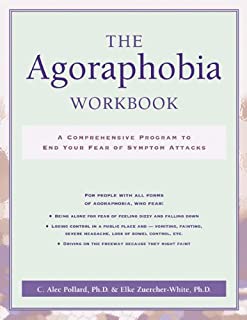Agoraphobia
Fear of places and situations that might cause panic, helplessness, or embarrassment.
Agoraphobia is an anxiety disorder that often develops after one or more panic attacks.
Symptoms include fear and avoidance of places and situations that might cause feelings of panic, entrapment, helplessness, or embarrassment.
Treatments include talk therapy and medication.
Cluster Number: F-1
Wiki Number: W003
Diagnosis: Agoraphobia
US Patients: 1.7% Adults
World Patients:
Sex Ratio: M-2W
Age Onset: 20+
Brain Area: Extra epinephrine – poor balance
Symptoms: environment unsafe-no escape
Progression: Open spaces or outside home; may lead to 10-30 minute panic attack or PTSD
Causes:
Medications: antidepressants; anti-anxiety
Therapies: relaxation, systematic desensitization, expanding exposuresCBT-50%
Youtube Video: What is Agoraphobia?
Amazon or Library Book:
The Agoraphobia Workbook
Click on the book to link or buy from Amazon.

